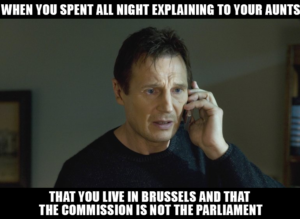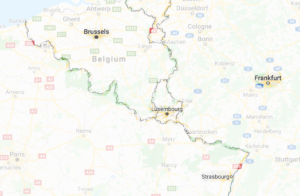
Strasbourg (abbr. STR) is the place you don’t want to go to. It is also one of the seats of the European Parliament (together with BRU and LUX). Conveniently located between the Vosges mountains and the Kingdom of Mordor (a “dying land not yet dead”), it is impossible to reach it from BrusselsBrussels (abbr. BRU, French: Bruxelles; Dutch: Brussel), officially the Brussels-Capital Region (French: Région de Bruxelles-Capitale; Dutch: Brussels Hoofdstedelijk Gewest), is a region of Belgium comprising 19 municipalities, including the City of Brussels, which is the capital of Belgium. The Brussels-Capital Region is located in the central portion of the country... without making a detour to Paris.
Don’t get us wrong, Alsace is lovely, the Cathedral of Strasbourg is simply stunning and the Marseillaise was actually written in this town. Here you can reconnect with yourself and with nature, as the life pace is much more relaxed than in other Eurocratic Cities. Alsace culture is remarkable as it has a mixture of French and German heritage (achieved through numerous wars). Because of that, and for its relative proximity to other EU centers, this town was chosen as the official seat of the Parliament. It was also the political center of the European Coal and Steel Community (1952 – 1967).

Symbolism aside, there is no reason to have a Parliament in Strasbourg; there is no reason for parliamentarians, assistants, lobbyists, molls and journalists to commute from Belgium to the most remote city of France on a monthly basis; and there is no reason to have so many empty buildings in Strasbourg or to spend a fortune and pollute the environment in this process.
The decision of having the Parliament in “Strasbourg” was enshrined in the Treaty of Amsterdam (1999), possibly after a few space cakes. It is fun to note that the European Parliament is the only Parliament in the world that can’t decide by itself on its own location. In fact, changing that treaty requires unanimity among member statesMember State (abbr. MS) is how eurocrats call a country which is part of the European Union. Clear writing guidelines recommend using EU country or EU countries instead, but some habits are hard to die..... And guess which one is using veto powers:
“It is a métter of préstige” explained the French government: “Brüssel ‘as de Commission européenne, Dtschermàny ‘as the European Central BankThe European Central Bank (ECB) administers monetary policy within the Eurozone. The bank's capital stock (€10,825,007,069.61) is owned by all 27 central banks of each EU member states. That's why it's very hard for a country to leave the Union: nobody would know how to split the 61 cents. The..., we ‘ave the Parlement européen”.
Through the decades there have been many unsuccessful attempts to remove the Strasbourg seat, the most recent in 2019, based on an interpretative loophole in the treaties.
